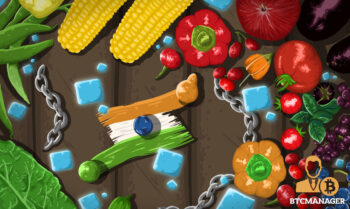
2018-8-3 21:00 |
As more attention is placed on food quality, organic products, and the avoidance of genetically modified foods, consumers are demanding a way to know where their food is coming from and how it is treated and handled before it reaches their tables. Fortunately, traceability and transparency are two things blockchain technology is equipped to deliver.
Farm to Table Tracking In ActionSupply chain tracking is essential when it comes to food. Mislabeled food is not only unfair to consumers but can cause adverse effects for those with allergies. Instances of contaminated products are often tedious and time-consuming to trace, and all of that time spent means continued risk for the population.
Further, as ethical treatment of animals becomes a higher priority for many, consumers want proof that the chickens laying their eggs are indeed cage-free and that the cows providing their dairy products are grass-fed. Murky standards for what qualifies as organic leave consumers uncertain if food is 100 percent pesticide free, and so on.
Blockchain technology is shaping up to be a solution for a better-managed food supply. Already, London-based Provenance has successfully applied itself to the challenge, boasting participation of 200 companies in the food and drink industry. An ID is assigned to each physical product, and with that ID, customers can access information about the product’s journey from farm to shelf. The businesses behind the products can upload data about their suppliers, certifications, and other information to support their product claims.
Several other startups are tackling this challenge as well. Some, like Vegan Nation, cater to specific markets that particularly value knowing where their food originates. The Vegan Nation platform aims to bring transparency and tracking, among other services and benefits, to vegans via blockchain technology.
IBM Food Trust Seeks Food Industry GiantsOn a large and more mainstream scale, a group of corporate giants including Walmart, Dole, Tyson, and Kroger, are working with IBM Food Trust to implement traceability technology. To encourage widespread participation, which will be necessary for developing a set of standards for data used in the tracking system, IBM is allowing companies to submit data for tracking free of charge.
The project is still in development with just a couple hundred SKU’s traceable end-to-end, though the company states it is getting close to being ready for sale. In fact, Nigel Gopie, part of the IBM Food Trust team, believes he recently ate the “world’s first meal traced entirely from farm to fork on the blockchain.” Gopie enjoyed a three-course meal of foods that, along with dozens of others, are traceable via blockchain technology.
As reported by the South China Morning Post, China is looking to blockchain to prevent further public endangerment, such as in the recent vaccine scandal. Among several ongoing food and drug tracking projects, one of China’s largest e-commerce companies, JD.com, alongside Tsinghua University and Walmart, joined with IBM to form the Blockchain Food Safety Alliance last December.
Skepticism, Challenges, and Solutions in the WorksSouth China Morning Post noted that the president of the Bitcoin Association of Hong Kong, Leonhard Weese, doesn’t believe blockchain is the next step for food tracking. His position is that it is too expensive, slow, and limited in its data storage capability.
Other challenges with using blockchain in this capacity have been identified as “achieving harmony on standards” and finding ways to tokenize items like fish. The Financial Times noted that “Ports, banks and commodities companies must [standardize] protocols so that they can share files and transact on the same platforms.”
This is a major undertaking, as is getting producers to adopt new ways of labeling that allow for accurate tracking.
An Australian startup, Ultimo Digital Technologies (UDT), is on the case, having developed prototypes of microchips that are affixed to a product’s packaging. The chips can monitor “changes in temperature, location, and even radiation levels.” Additionally, the manufacturer will receive a message once the product is opened.
Along these lines, IBM has applied for a patent for “Blockchain-Based Food Product Shelf Life Management.” The patent application describes a blockchain-based system that could include “creating a unique code to represent the production date and the product based on a hash of one or more blocks of a blockchain” to allow for verification of the product.
With IBM providing the technological solutions behind the IBM Food Trust and efforts of mega-corporations like Walmart, strides are being made to make blockchain-based food tracking and management a reality sooner than later.
Frank Yiannas, vice president of food safety for Walmart, states in his article “A New Era of Food Transparency Powered by Blockchain,” that he started out as a blockchain skeptic.
Having seen virtually no improvement in food tracking and the industry’s ability to mitigate and trace contaminated foods from 2006 to 2018, Yiannas knew a significant change was needed. However, until he saw blockchain in action, he wasn’t ready to believe it was the answer.
Now, Walmart and IBM have put it into practice with both mangoes and pork, and he has seen for himself the dramatic change digital tracking affords. For instance, blockchain was able to trace the source of a mango in 2.2 seconds, while existing methods took just under seven days to do the same. When put into context of a contamination issue, seven days is a lot of time for those mangoes to go into the stomachs of a lot of people.
Yiannas further states that because one producer’s product could end up in multiple products, the complexity of tracing food is overwhelming:
“In today’s food system, the output from one ingredient producer could end up in thousands of products on a grocery store shelf.”
Yiannas anticipates that the use of blockchain technology to monitor the food supply will lead to reductions in wasted food, food fraud, and public distrust of food suppliers. With the many players in the food game including producers, suppliers, restaurants, and many more, innovators have a task ahead to streamline and upgrade the supply chain in the industry. On the flip side, with so many players, many teams are working on finding blockchain-based solutions, so we can expect to see some form of integration in the near future.
The post Hungry for Blockchain: Companies Big and Small Tackle Transparency in the Food Industry appeared first on BTCMANAGER.
origin »Bitcoin price in Telegram @btc_price_every_hour
High Performance Blockchain (HPB) на Currencies.ru
|
|













